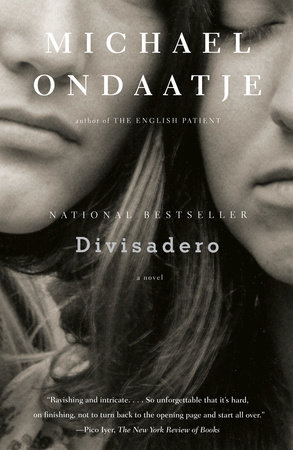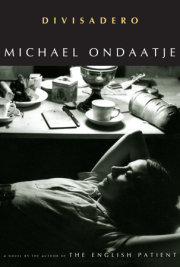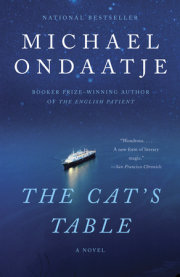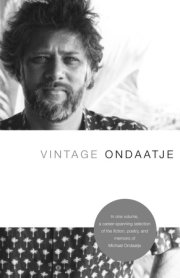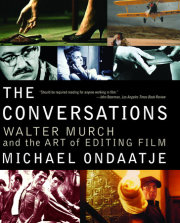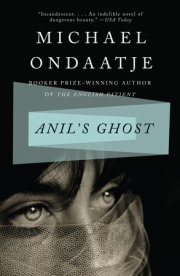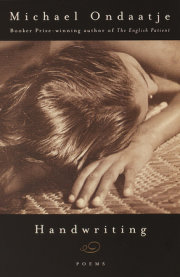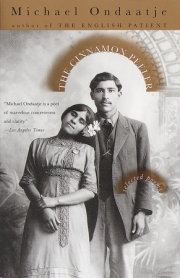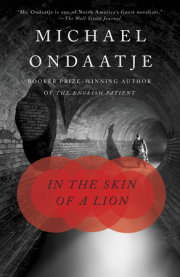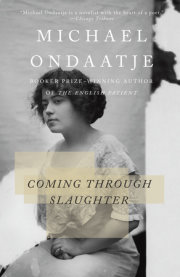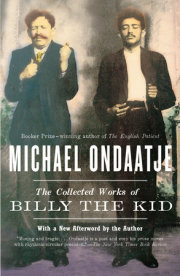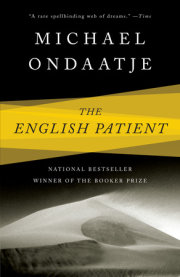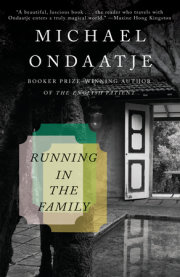From the celebrated author of The English Patient and In the Skin of a Lion comes a remarkable new novel of intersecting lives that ranges across continents and time.
In the 1970s in Northern California, near Gold Rush country, a father and his teenage daughters, Anna and Claire, work their farm with the help of Coop, an enigmatic young man who makes his home with them. Theirs is a makeshift family, until it is riven by an incident of violence—of both hand and heart—that sets fire to the rest of their lives.
Divisadero takes us from the city of San Francisco to the raucous backrooms of Nevada’s casinos and eventually to the landscape of south-central France. It is here, outside a small rural village, that Anna becomes immersed in the life and the world of a writer from an earlier time—Lucien Segura. His compelling story, which has its beginnings at the turn of the century, circles around “the raw truth” of Anna’s own life, the one she’s left behind but can never truly leave. And as the narrative moves back and forth in time and place, we discover each of the characters managing to find some foothold in a present rough hewn from the past.
Breathtakingly evoked and with unforgettable characters, Divisadero is a multilayered novel about passion, loss, and the unshakable past, about the often discordant demands of family, love, and memory. It is Michael Ondaatje's most intimate and beautiful novel to date.
“Ravishing and intricate . . . Few experiences in contemporary fiction are as sensual and absorbing as making one’s way through the pages of an Ondaatje novel. And there is a different, a deeper delight in going through his books a second time to see the secret stitching . . . The question that insistently haunts these elliptical and delicate works is how much their very beauty takes us away from the wars and scenes of great pain they describe, and to what extent, in courting art, they leave real life behind. Divisadero is an epic of intimate moments . . . The book is, among other things, a parable of contemporary America . . . When people call Ondaatje a poetic novelist, they are referring in part, of course, to his rare gift for language and observation. A scene of a boy on a runaway horse during an eclipse is as astonishing and hallucinatory as any such passage I can remember reading. Yet the deeper aspect of his poetic background is that his narratives proceed with the interlaced complexity of a long lyric poem . . . Part of the special delight of reading one of his books comes from the impression we get of a deeply curious traveler opening his worn suitcase and letting all the exotic bric-a-brac he’s collected on his journeys tumble out . . . Each of the romances in the book is gorgeous and singular in its effects . . . Ondaatje’s ability to fashion scenes that are at once exact and suggestive accounts not only for the sensual tingle of the books, but also for their literary pleasures . . . There is always a clear and unhurried spaciousness to Ondaatje’s paragraphs; they proceed with the deliberation and hush of a work of meditation, even while turning their attention to things of the secular world . . . Divisadero extends the liberating and original territory of that earlier triumph [The English Patient] so unforgettably that it’s hard, on finishing, not to turn back to the opening page and start all over.”
—Pico Iyer, New York Review of Books
“Exquisitely crafted and imbued with Ondaatje’s acutely sensitive intelligence, Divisadero pulls its readers inside the novelist’s craft like being inside an intricate pocket watch to learn its movements.”
—Bob Hoover, Pittsburgh Post-Gazette
“Ondaatje’s best books are kaleidoscopic meditations on memory, violence, time and sexuality are held together less by linearity than by rhyming action, thematic echoing and inspired juxtaposition . . . One doesn’t come to Ondaatje for resolution. One comes for the language, the discreet imagined moments, the exact metaphors, the turn of a phrase–and for the thrill of watching a writer attempting, and for the most part, succeeding, in his desire, through juxtaposition, to make the world more than it is.”
—Ethan Rutherford, Minneapolis Star-Tribune
“Divisadero echoes the writer’s earlier fiction in its mastery both of storytelling and of fine writing . . . It is beautifully intricate, yet credible, a subtle play on cause and effect . . . Ondaatje’s exquisite use of imagery propels his story of loss and displacement to an impressive level of fictional power . . . A subtle, stirring novel, a fine book and an arresting one.”
—Nancy Schiefer, London Free Press (Ontario)
“Divisadero is a river of images and scenes that flows through the characters’ lives like fate. So, reader, embark and journey in awe of this river master . . . Divisadero is alive, pulsing and irreducible . . . Wonders and genius [have] shaped this design . . . It is a collage, though never random, which artfully revisions the temporal into a masterpiece that will permanently affect the reader.”
—Mary Jo Anderson, Chronicle Herald (Halifax)
"Comparisons of Ondaatje to Faulkner and García Márquez are apt. His sense of time, like theirs, is one of curling, recurring flow . . . Divisadero finds Ondaatje in familiar form, which is to say eloquent, finely tuned form . . . [It] wends a crooked path, which is part of its great magic and beauty . . . The second part of the novel moves supplely from one character to another. Along the way come many gorgeous passages, many dreamlike sequences . . . Ondaatje is a very sexy writer and understands well the ins and outs of the courtly-love relationship . . . Ondaatje has always been a real craftsman, spending his one true commodity, time, with the utmost patience and care.”
—Jon Raymond, Bookforum
“A bleakly moving rendering of lives disrupted by brutality and loss . . . Ondaatje demands a reader’ s trust, an acceptance that a work of fiction can accommodate the peculiar alignments that bless and bedevil everyday life . . . The crosscurrents of his writing flow and ripple against each other as poems might. Sequences of images set themselves out in their individual beauty and lucidity . . . Give in to Ondaatje and his language will seduce you . . . He is at his best let loose in the dream world of his warmblooded imagination . . . There is something endearingly human about this book, for all its art.”
—Erica Wagner, New York Times Book Review
“The more you give Divisadero, the more it gives in return . . . Mr. Ondaatje does not write in mundanely linear ways, nor does he see events as isolated instances. There are always webs of memory, slips of time and divisions in experience to break the spell of an ordinary world . . . Divisadero has a highly literary sensibility . . . Anna finds meaning in her own life by plumbing the history of Lucien, now a famous dead literary figure[;] trust Mr. Ondaatje to express [this] exquisitely . . . Since Mr. Ondaatje writes with such grace, he brings a haunting, sensual delicacy to this latter part of Divisadero . . . He is a writer of intense acuity. His eminence is well earned.”
—Janet Maslin, New York Times
“[The] division between the world as it is and the world as we imagine it to be is what gives our lives such poignancy, Ondaatje seems to be saying . . . This is a beautiful idea . . . With this elegant, singular book, Michael Ondaatje proves that it is not too brilliant a lodestar to shove straight into the heart of a novel.”
—John Freeman, Sunday Star-Ledger
“[Divisadero has] a heck of an opening. And Ondaatje delivers on the promise of that beginning . . . His poetical skills are much in evidence in this novel . . . He’s prodigiously talented, conjuring richly detailed scenes with a minimum of words . . . Beautiful and haunting.”
—Soyia Ellison, Atlanta Journal-Constitution
“The prose is rich in image and ideas . . . Doubling adds resonance to the Segura chapters, which are full of charming anecdotes . . . Ondaatje may well leave you hungry–for more of Claire, for the fate of Coop, for Anna in old age, for a sample of Segura's writing or for an easier, neater plot. But he could never leave you empty, the way even the fattest beach read can.”
—Jeffrey Burke, Bloomberg News
“Hauntingly beautiful . . . What an unusual, and unusually rich, experience it is to read Divisadero, the new novel by Michael Ondaatje . . . Ondaatje expertly shift[s] into different voices and tenses, disrupting the conventional chronology with the easy grace that has become his hallmark . . . There are countless examples of perfect phrasing in Divisadero, and those who spend time within its pages will discover even more proof–not that they needed it–of Michael Ondaatje's peerlessness as a storyteller and poet.
—Jeff Turrentine, Washington Post Book World
“Magnificent . . . Ondaatje pulls off the plotlines masterfully . . . He introduces memorable characters [and] scenes of majestic texture and captivating imagery . . . From its first to last telling sentence, this aesthetic tale, poetic with human detail, is a rare and precious pleasure.”
—Don Oldenburg, USA Today
“One can consider Divisadero a novelistic evocation of Buddhist ideas . . . In ways too myriad to enumerate, the luminous last hundred pages complement and refract what came before.”
—Art Winslow, Chicago Tribune
“Divisadero plays whimsically with chronology and memory, with fantasy and historical fact . . . Ondaatje also employs a more unusual tactic: having followed three California characters from childhood into their 30s, he spins around and takes two mature French characters in order to trace their histories back in time. It's a brilliant maneuver . . . Misty abstraction is always the danger of lyrical imagination [but] Ondaatje’s success as a novelist is due, in large part, to his consistent ability to avoid that pitfall.”
—Marcela Valdes, San Francisco Chronicle
“Divisadero is powered by narrative force and contains finely chiseled characters. [It] is also a book profuse with poetic imagery, profound themes and the delicate architecture of open verse . . . Stunning bits of lyrical observation turn up on almost every page . . . Breathtaking.”
—John Barron, Chicago Sun-Times
“Ondaatje knows the value of dramatic action and strong, sympathetic characters, and is working at his peak in this book.”
—David Walton, Pittsburgh Tribune-Review
“An exquisitely realized novel . . . The most soulful writers, like the great jazz musicians, will keep finding new ways to play the same gorgeous notes again and again. Michael Ondaatje’s voice–his prismatic perspective on time and memory, on the elegiac repetitions of life–is so particular and distinctive that you can spot it at 20 yards . . . Divisadero is a haunting, meticulously conceived novel . . . [It has] the texture of a hand-woven tapestry . . . Ondaatje is a master at constructing breathtaking passages dropped in as casually as stars in a night sky.”
—Gail Caldwell, Boston Globe
“With this masterful novel, the Man Booker Prize—winning author uses the art of storytelling to reflect and refract the truth we cannot bear to look at full-on . . . As ever, Ondaatje writes with mesmerizing prose and authority . . . Divisadero is art; it is stuffed with unbearable love, and it is magnificent.”
—Ellen Kanner, Miami Herald
“Page for page, Divisadero is an exhilarating read . . . The rise and fall of every well-turned sentence could be set to music, and his writing has a vivid physicality.”
—Ella Taylor, LA Weekly
“Ondaatje [is] prodigiously talented . . . His fictions offer the pleasures of old-school art-house films–philosophical atmospherics, loads of poetic sensibility, organic riffs on art, and furious bouts of sex that crash upon hapless folk with the anarchic force of natural disaster.”
—Ben Dickinson, Elle
“A mesmerizing saga . . . Ondaatje has woven a tale of loves lost and families sundered in a brilliantly poetic voice–a tale that lingers long after its telling.”
—Deborah Donovan, Bookpage
“Not to be missed . . . Intricate, lyrical, profoundly moving, this brilliantly imagined meditation on love, loss and memory unforgettably dramatizes the rueful realization that ‘[t]here is the hidden presence of others in us . . . . [and] We contain them for the rest of our lives, at every border that we cross.’ ”
—Kirkus Reviews (starred)
“My life always stops for a new book by Michael Ondaatje. I began Divisadero as soon as it came into my possession and over the course of a few evenings was captivated by Ondaatje’s finest novel to date . . . Divisadero is a deeply ordered, full-bodied work, illuminating both what it means to belong to a family and what it means to be alone in the world . . . Like Nabokov, another master of twinning, Ondaatje’s method is deliberate but discreet, and it was only in rereading this beautiful book—which I wanted to do as soon as I finished it—that the intricate play of doubles was revealed. Every sign of the author’s genius is here: the searing imagery, the incandescent writing, the calm probing of life’s most turbulent and devastating experiences. No one writes as affectingly about passion, about time and memory, about violence, subjects that have shaped Ondaatje’s previous novels. But there is a greater muscularity to Divisadero, an intensity born from its restraint. Episodes are boiled down to their essential elements, distilled but dramatic, resulting in a mosaic of profound dignity, with an elegiac quietude that only the greatest of writers can achieve.”
—Jhumpa Lahiri, Amazon.com
“Divisadero is easy to read, not because its theme and plot are simple but because the reader simply wants to read it . . . What this at once powerful and beautiful novel is about is the division of [the main characters’] lives into parts.”
—Brad Hooper, Booklist (boxed and starred review)
“Emotionally riveting . . . Challenge[s] readers to uncover subtle but explosive links between past and present . . . Divisadero delivers Ondaatje’s trademark seductive prose, quixotic characters and psychological intricacy.”
—Publishers Weekly
“The bewitching, assured Divisadero is the perfect reminder of why Ondaatje deserves to be honoured with his global peers . . . Ondaatje [has] maestro-like control and [a] page-turning plot. In the novel’s final pages, the genius of this multi-layered, multi-perspective approach fully reveals itself.”
—Rachel Giese, CBC Book Review
“A heart-wrenching story about a tight-knit family that’s shattered forever by one pivotal event . . . Divisadero has been called Ondaatje’s most accessible novel, perhaps because it's about the universal subject of family . . . Ondaatje’s writing is evocative, powerful and deeply intimate. The reader can't help but care about all of the characters.”
—Paula Arab, Calgary Herald
“Divisadero shines with an indisputable and incomparable power . . . [It] is so rich that every description or summary beggars its accomplishment . . . Savouring Ondaatje’s subtle expertise in word cuisine is an indelible pleasure, pleasure that, incredibly, deepens with each book penned by this genius (there is no other word for a writer of such grace and depth). His unique gift is that his stories perform an inexorable seduction, impossible to resist . . . His words unfold with the dazzling variety of a courtesan, infinite, unpredictable, always intriguing . . . For all that Divisadero is elegant and erudite, it is also a breathtaking tango of violence, ‘raw truth’ . . . Although the attentive reader will delight in every sentence, will revel in the vividly original language and narrative approach, Divisadero refuses the aggrandizement of pyrotechnics. By virtue of that reserve, the novel accomplishes an intimacy that is extraordinary, nakedly beautiful.”
—Aritha van Herk, Globe and Mail (Toronto)
“It’s Ondaatje’s singular achievement to explore the heavy costs and burdens of colliding human lives with a lightness of touch and clarity of vision that makes for dead-run compelling reading . . . This novel everywhere offers evidence of a writer so entirely poised in his arrangements that he can move the action and interior lives of his characters wherever and whenever he pleases . . . Gorgeous.”
—Randy Boyagoda, National Post
“Michael Ondaatje is the Canadian William Faulkner, writing novels that are visually unforgettable, stylistically inimitable, utterly devoted to the rise and fall of the human heart . . . In his new novel, he remains true to form . . . Compelling and moving.”
—Darryl Whetter, Vancouver Sun
“Ondaatje’s prose is breathtaking . . . Divisadero is his most beautiful [novel] . . . I look forward to several returns to this luminous book by one of our most thoughtful and erudite writers.”
—Charlotte Gray, Ottawa Citizen
“All of Michael Ondaatje’s novels bear the unmistakable signature of a fine poet’s turn to fiction. The spare erotics and lucid passions of Divisadero engage readers first and last through Ondaatje’s supple and resonant gifts with language, syntax and style, in the service of stories and voices that resonate far beyond the page . . . Ondaatje shows us once again how and why our contemporary poets and novelists are held in such high regard.”
—Neil Besner, Winnipeg Free Press
“Divisadero has the ensemble qualities of early Robert Altman films and the poetic intensity of Ingmar Bergman’ s oeuvre, all rendered in Ondaatje’s characteristically poetic style . . . [It] is a story full of perfect shots and passionate performances . . . What holds [the] many narratives in check is the fluidity of Ondaatje’s masterly writing.”
—Omar Majeed, Montreal Gazette

